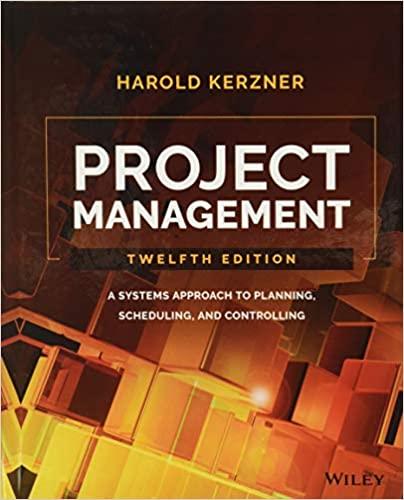Vince had been a morning person ever since graduating from college. He enjoyed getting up early. He
Question:
Vince had been a “morning person” ever since graduating from college. He enjoyed getting up early. He knew his own energy cycle and the fact that he was obviously more productive in the morning than in the afternoon.
Vince would come into work at 6:00 a.m., 2 hours before the normal work force would show up. Between 6:00 a.m. and noon, Vince would keep his office door closed and often would not answer the phone. This prevented people from robbing Vince of his most productive time. Vince considered time robbers such as unnecessary phone calls lethal to the success of the project. This gave Vince 6 hours of productive time each day to do the necessary project work. After lunch, Vince would open his office door and anyone could then talk with him.
A Tough Decision
Vince’s energy cycle worked well, at least for Vince. But Vince had just become the project manager on a large project. Vince knew that he might have to sacrifice some of his precious morning time for team meetings. It was customary for each project team to have a weekly team meeting, and most project team meetings seemed to be held in the morning. Initially, Vince decided to go against tradition and hold team meetings between 2:00 and 3:00 p.m. This would allow Vince to keep his precious morning time for his own productive work. Vince was somewhat disturbed when there was very little discussion on some of the critical issues and it appeared that people were looking at their watches. Finally, Vince understood the problem. A large portion of Vince’s team members were manufacturing personnel that started work as early as 5:00 a.m. The manufacturing personnel were ready to go home at 2:00 p.m. and were tired.
The following week Vince changed the team meeting time to 11:00 a.m. to 12:00 p.m. It was evident to Vince that he had to sacrifice some of his morning time. But once again, during the team meetings there really wasn’t very much discussion about some of the critical issues on the project and the manufacturing personnel were looking at their watches. Vince was disappointed and, as he exited the conference room, one of the manufacturing personnel commented to Vince, “Don’t you know that the manufacturing people usually go to lunch around 11:00 a.m.?”
Vince came up with a plan for the next team meeting. He sent out emails to all of the team members stating that the team meeting would be at 11:00 a.m. to noon as before but the project would pick up the cost for providing lunch in the form of pizzas and salads. Much to Vince’s surprise, this worked well. The atmosphere in the team meeting improved significantly. There were meaningful discussions and decisions were being made instead of creating action items for future team meetings. It suddenly became an informal rather than a formal team meeting. While Vince’s project could certainly incur the cost of pizzas, salads, and soft drinks for team meetings, this might set a bad precedent if this were to happen at each team meeting. At the next team meeting, the team decided that it would be nice if this could happen once or twice a month. For the other team meetings, it was decided to leave the time for the team meetings the same at 11:00 a.m. to noon, but they would be “brown bag” team meetings where the team members would bring their lunches and the project would provide only the soft drinks and perhaps some cookies or brownies.
QUESTIONS
1. How should a project manager determine when (i.e., time of day) to hold a team meeting? What factors should be considered?
2. What mistakes did Vince make initially?
3. If you were an executive in this company, would you allow Vince to continue doing this?
Step by Step Answer:

Project Management A Systems Approach To Planning Scheduling And Controlling
ISBN: 9781119165354
12th Edition
Authors: Harold Kerzner





